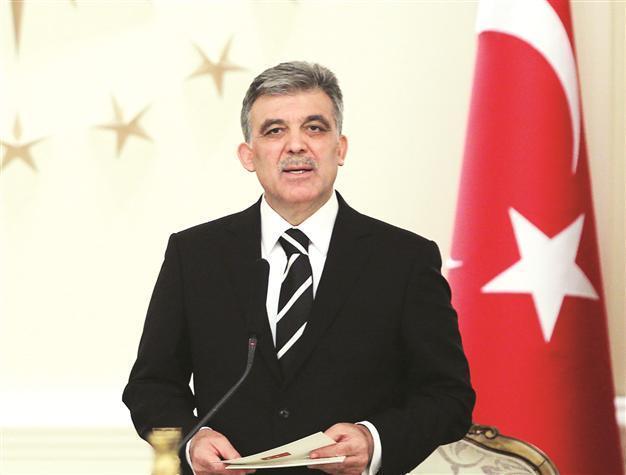Lifting immunities a dead-end, Gül warns
ANKARA - Hürriyet Daily News

President Abdullah Gül.AA photo
President Abdullah Gül reiterated his opposition to lifting the immunity of nine Peace and Democracy Party (BDP) deputies and one independent deputy, urging the government not to push Turkey toward a dead end. The day before Prime Minister Recep Tayyip Erdoğan had dismissed comments about his disagreement with the president over the issue.“There are similar examples from our recent political history. We should not push ourselves toward dead-end streets. Everyone has responsibilities with regard to this issue,” Gül told Ankara media bureau chiefs Nov. 29.
“We have witnessed that past experiences did not take us anywhere. That’s why I believe everyone needs to manage these things with a sense of responsibility. There we already have a lot of problems, difficulties. They may become chronic,” he said, referring to the abolishment of the immunity of Kurdish lawmakers in 1994, which only produced more troubles for Turkey.
Difference in views
Once close fellows and cofounders of the Justice and Development Party (AKP), Gül and Erdoğan now differ on a number of critical issues, which the president explicitly shared in his speech at the opening of Parliament on Oct. 1. Erdoğan seemed committed to push for the lifting of the immunities of the nine BDP deputies and independent deputy, asking his parliamentary group to take the necessary action in this regard. The discussion emerged after Gültan Kışanak, co-chair of the BDP, was pictured warmly hugging a member of the outlawed Kurdistan Workers’ Party (PKK).
Gül also warned BDP deputies to act in line with lawmaker responsibilities and distance themselves from terrorism. “Statements promoting terror, blood and violence cannot be accepted. They have no place in democracy.”
“All politicians who have been elected to Parliament should be aware of this. Everybody should be really careful.”
Burhan Kuzu, a senior AKP member, replied to Gül’s statement the same day, saying the two politicians should not be expected to agree on every issue. “We will pay attention to its echoes in society, but we cannot think that it will have consequences similar to those of 1994.”
PKK in weakest period
The president also made a broad analysis of the current state of anti-PKK fighting and ways to end the Kurdish question. Supporting Erdoğan’s proposals to send senior PKK members to third countries to end violence, Gül said nobody’s aim was to see more bloodshed.
Experts are working on methods to end this problem but he was concerned they could be sabotaged as in the past, Gül said. He added that a more substantial look was necessary to deal with the problem. “The most important part of it is disarmament of armed members. Those [terrorists] outside Turkey are important. There are so many members of organizations that we cannot arrest. They should not pose a threat to Turkey.”
PKK leader Murat Karayılan’s statement that the organization planned to obtain more weapons rather than disarming was part of their “psychological warfare” and an attempt to take advantage of Turkey’s poor relations with its southern neighbors, the president said. The PKK has suffered heavy damage recently, he added.
“They are living through their weakest period. They were running behind big successes and planning to carry out important acts. They even called this the ‘final year.’”
Coup inquiry report
The president hailed Parliament’s coup inquiry commission report as historic and said it depicted the current state of Turkish democracy. “This serves at least as a deterrent,” he said, adding that these kinds of steps would prevent future mistakes. “I do not think it contains a sense of revenge. But reflecting what has happened in the past in an explicit way is very important and making mistakes in the future will, of course, be more difficult.” The commission analyzed the 1971, 1980 and 1997 coups and made substantial suggestions to prevent future military coups.
















